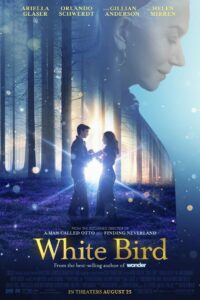
Wonder – White Bird
Here’s the setup for this movie set in 1942: Sara, a 15-year-old girl in Alsace, France, is facing mounting challenges as the German occupation intensifies, with tensions rising and the ever-present threat of round-ups becoming a grim reality. Things get tense! But she’s rescued by Julien’s family—a boy dealing with polio—whom she was initially wary of. Over time, they become really good friends while she’s hiding out.
Now about the movie itself—it tries to stick super close to the book it’s based on, which is cool and all but sort of messes up getting across its important message.
So Marc Forster thought he could catch some of that big box office magic like what happened with “Wonder” by Stephen Chbosky. But comparing it to that film with Julia Roberts and Owen Wilson? Bit of a stretch if you ask me!
The thing is, just ’cause they tossed in a character expelled for bullying at the start doesn’t mean it flows smoothly into Helena Mirren’s story about her past as a young Jewish girl facing persecution. Yeah, both stories come from works by R.J. Palacio—he wrote “Wonder” and also this graphic novel—but cramming everything from a book onto screen doesn’t always work out.
Forster should know better from making movies like “Christopher Robin” or even “The Kite Runner.” Seriously, sometimes adapting books needs more than just sticking stuff together because it worked on paper!
The movie really digs into how some French folks worked with the Nazis during the occupation, and it doesn’t go easy on anyone—even kids aren’t spared. There’s this younger character who becomes way nastier than the Nazis themselves.
But here’s the thing: while trying to make a strong statement about those times, the movie adds in some stuff that feels like it’s out of a fairy tale or just doesn’t fit right with the serious vibe.
There’s this part where Julien helps with projecting movies and, in his mind, he imagines the images appearing on the wall where Sara is hiding, which feels kind of engaging. But then, out of nowhere, there’s an exaggerated scene with wolves that just shatters any sense of realism. I won’t tell you exactly when or why it happens to avoid spoilers, but let’s say it’s not set up well for what should be a serious story about understanding between people who face discrimination—like how Sara learns empathy towards Julien, whom she used to make fun of because of his disability.
It had potential to be really powerful for young audiences and sometimes hits that mark. Sadly, it doesn’t quite take full advantage of its potential.
To watch movies and TV shows online, please sign up with our partner, a legit streaming service.
Get Started ➔






